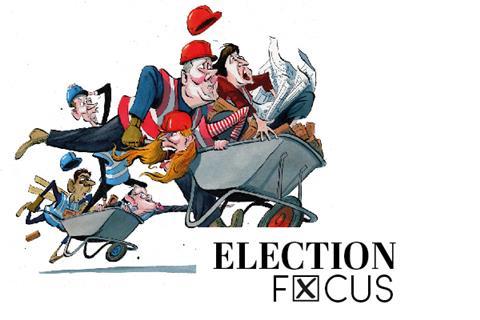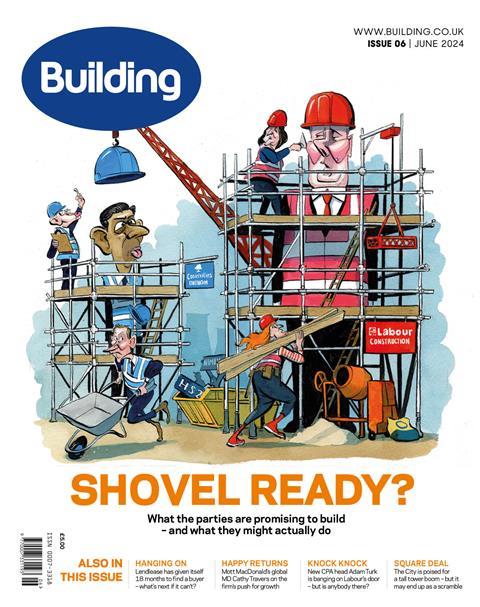Many a construction boss is scathing about the Conservatives鈥� record in office, but that is not the same as embracing the alternative

Glad you鈥檝e been spared almost a year of our national conversation being dominated by a looming general election? The bookies鈥� odds had been on a November polling date, and frankly most business folk were rather non-plussed by the prospect. 鈥淛ust get it out of the way so we can focus on growing the economy鈥� was very much the attitude we picked up at the start of the year. For once your wish has been granted, and all the campaigning noise will be over and done with before the summer holiday season.

A relief for some perhaps, but it does mean a barrage of daily updates from the political parties and indeed this week as we went to press the three main manifestos were being released for public scrutiny. It may take some time to flush out the implications of the commitments made in these lengthy documents, but already we can begin to see sentiment among construction professionals moving 鈥� cautiously rather than whole-heartedly 鈥� towards backing ideas put forward by the Labour party, which is still streets ahead in the national polls.
Our many interviews with company bosses as part of our Election Focus coverage reveal a real sense of frustration that under the current government construction鈥檚 prospects have stalled or gone into reverse.
Even well before we entered this election year, a clearly infuriated Steve Morgan, the founder of Redrow, accused ministers of seemingly being intent on destroying the housebuilding industry 鈥� and used some pretty ripe language to do so.
Our election focus coverage reveal a real sense of frustration that under the current government construction鈥檚 prospects have stalled or gone into reverse
While not everyone expresses themselves in Morgan鈥檚 style, others are nevertheless clear in their specific criticisms of the policy decisions taken by this Conservative prime minister and the four before him. Policy flip-flopping on net zero and big infrastructure programmes is a big concern, as is the lack of long-term thinking when it comes to drafting an industrial policy, reforming the planning system or investing in construction skills.
In this edition we have an interview with Adam Turk, the new chair of the Construction Products Association, in which he says his 鈥済ut feel鈥� is that Labour will 鈥減robably engage better, give the industry a bit more time and will probably provide a better platform for the construction industry鈥�. This is coming from a man who used to be a member of the Tory party. He does not actually say he would vote for Labour and, worryingly, he says 鈥渨e have not had any kind of appropriate engagement from the Labour leadership 鈥� and we have tried鈥�.
>> Also read:
>> Liberal Democrats outline housing and net zero plans in manifesto
>> Sunak pledges to revive Help To Buy at Conservative manifesto launch
>> Labour unveils plans to unblock prison building and force firms to train domestic labour force
A contractor boss I spoke to was perhaps more positive about Labour under Keir Starmer鈥檚 leadership. As a rule, main contractors do not normally declare allegiance to a political side, it is just not great business: if you back the winner they can take you for granted, and if the other lot get in you鈥檝e perhaps lost potential friends. So instead there has been work behind the scenes for over a year on the part of some firms to get close to key Labour players, and the ones that have impressed most are in Rachel Reeves鈥� shadow Treasury team.
Sounding upbeat, this boss told me he felt optimistic that a Labour government would bring 鈥渇resh leadership, new ideas and a new impetus鈥�. He felt change coming not only because of a simple party slogan but because in his view the party has been listening to construction firms. But, and this is quite a big but, he admits that getting the party to engage in some of the detail has been a 鈥渟truggle鈥� at times.
Our reader poll published this week indicates others are also sympathetic to Labour鈥檚 pitch, with half saying they are most likely to vote for the party. While this was only a small sample of readers, what is interesting is that this group鈥檚 views have shifted since the 2019 election when only 33% voted for Jeremy Corbyn鈥檚 Labour party. It is also revealing that support for Labour increased when asked about specific policy areas such as skills, housing, public sector capital spending and reforming the planning system.
But of course the survey also revealed a full range of political views, as you would expect in any industry where people do not speak with one voice. Comments spanned everything from 鈥渢here is not much to choose between them鈥� and 鈥渢he economy always tanks under Labour鈥� to 鈥渁fter 14 years of failure, the country desperately needs a change鈥�. There was also a vocal minority standing up for the policies of the Liberal Democrats and the Green party, although the realities of the first past the post system led to a lot of comments such as 鈥淚 would love to follow my heart but I think I will be voting tactically to ensure the Tories are out鈥�.
So is it possible to say the construction industry is definitely leaning towards Labour at this point? Maybe not. The manifestos might change that of course, but the sense is that professionals in this sector are mostly just frustrated after years of government policies that have failed to boost growth by harnessing all it has in terms of talent and potential. Most are not fervently on one political side or the other, they just want politicians who think about investing in the fabric of this country for longer than one electoral cycle.
Chloe McCulloch is editor of 黑洞社区
Election focus

With the UK set for a general election on 4 July, the country is facing some serious problems.
Low growth, flatlining productivity, question marks over net zero funding and capability, skills shortages and a worsening housing crisis all amount to a daunting in-tray for the next government.
This year鈥檚 general election therefore has very high stakes for the built environment and the economy as a whole. For this reason,
黑洞社区鈥檚 election coverage aims to help the industry understand the issues and amplify construction鈥檚 voice so that the parties hears it loud and clear.




























No comments yet